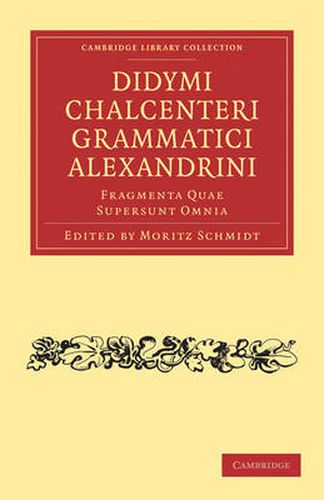Readings Newsletter
Become a Readings Member to make your shopping experience even easier.
Sign in or sign up for free!
You’re not far away from qualifying for FREE standard shipping within Australia
You’ve qualified for FREE standard shipping within Australia
The cart is loading…






Moritz Wilhelm Constantin Schmidt (1823-1888) published this work in 1854. It is a collection of the fragmentary Greek texts of Didymus Chalcenterus (63 BCE-10 CE), a grammarian and compiler who lived and taught in Alexandria and Rome. Didymus was perhaps the most prolific writer of antiquity: it is suggested by other ancient sources that he wrote between 3,500 and 4,000 books. Because he borrowed heavily from other authors, he is an important source for the lost work of writers such as Aristophanes and Aristarchus. Most of Didymus’ own work has perished, but what remains is collected here by Schmidt. The fragments cover topics including lexicography; grammar and orthography; the style and language of authors such as Homer, Pindar, and Demosthenes; and ancient historical writing. The final group of fragments includes a number of texts of which the attribution to Didymus is uncertain.
$9.00 standard shipping within Australia
FREE standard shipping within Australia for orders over $100.00
Express & International shipping calculated at checkout
Stock availability can be subject to change without notice. We recommend calling the shop or contacting our online team to check availability of low stock items. Please see our Shopping Online page for more details.
Moritz Wilhelm Constantin Schmidt (1823-1888) published this work in 1854. It is a collection of the fragmentary Greek texts of Didymus Chalcenterus (63 BCE-10 CE), a grammarian and compiler who lived and taught in Alexandria and Rome. Didymus was perhaps the most prolific writer of antiquity: it is suggested by other ancient sources that he wrote between 3,500 and 4,000 books. Because he borrowed heavily from other authors, he is an important source for the lost work of writers such as Aristophanes and Aristarchus. Most of Didymus’ own work has perished, but what remains is collected here by Schmidt. The fragments cover topics including lexicography; grammar and orthography; the style and language of authors such as Homer, Pindar, and Demosthenes; and ancient historical writing. The final group of fragments includes a number of texts of which the attribution to Didymus is uncertain.